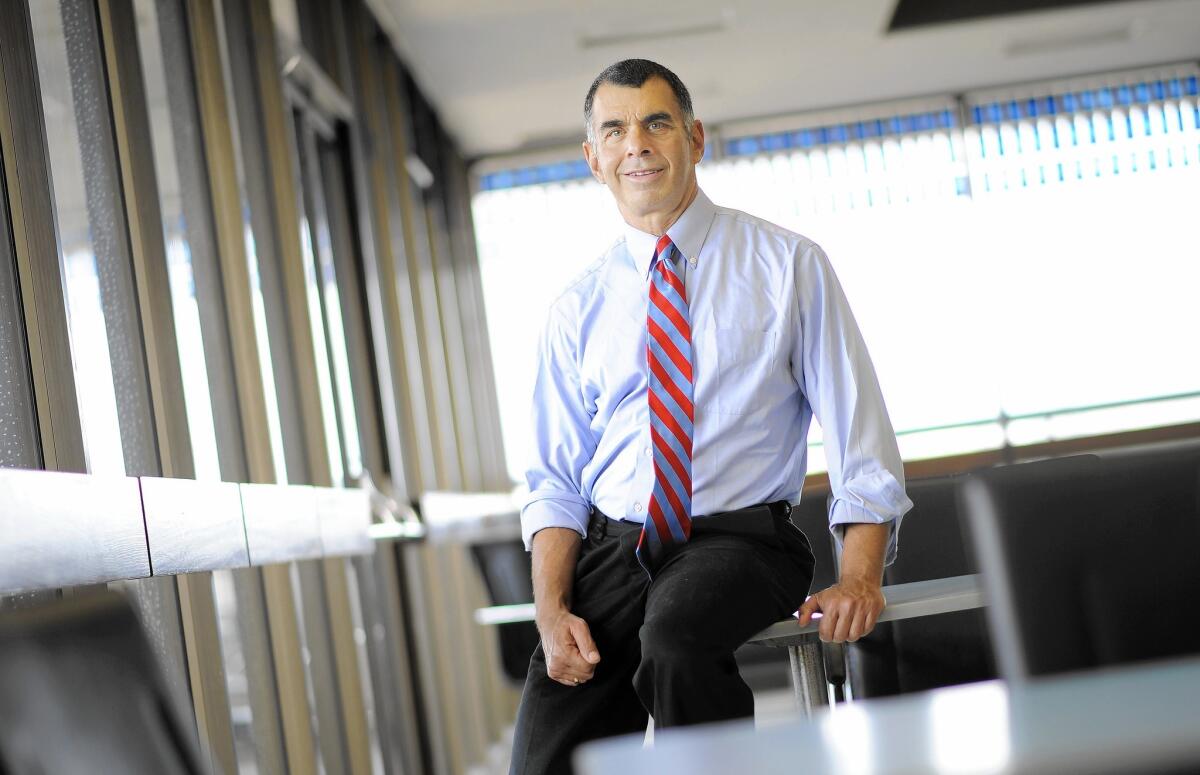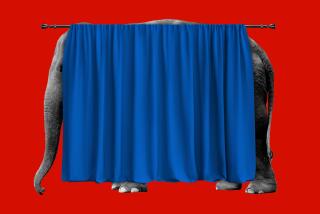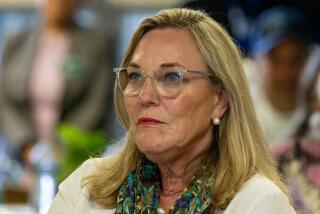Mitch Katz poised to lead L.A. County’s consolidated healthcare agency

Dr. Mitch Katz currently heads L.A. County’s Department of Health Services.
Amid a major reorganization of Los Angeles County’s healthcare bureaucracy, physician and administrator Mitch Katz is poised to become arguably the most powerful nonelected official in the nation’s largest local government.
Katz currently heads the Department of Health Services, a system of county hospitals and clinics with 20,000 employees and an operating budget of $4.8 billion. Now, over the objections of a vocal group of critics, county supervisors appear prepared to place him atop a significantly larger agency that will consolidate his department with separate county mental health and public health operations. The new super health agency would account for nearly a third of the county’s $27-billion budget.
Already county government’s highest-paid department head at nearly $400,000 annually, Katz has been praised for turning around massive budget deficits in the hospital system and helping to smooth the county’s transition to Obamacare.
A primary care doctor, he makes a point of devoting one day a week to seeing patients in county health facilities. He’s cultivated supporters both among elected officials and the doctors he supervises.
“There are a number of people — and I would count myself among them — that would walk through a wall for the guy,” said Brad Spellberg, chief medical officer of Los Angeles County-USC Medical Center in Boyle Heights.
He’s also built a reputation for being down-to-earth, riding his bike to work and keeping a bed in his downtown office like a freshman congressman, for nights when he has to sleep at the job.
No official decision has been made about who will lead the new health agency, which could be formally approved Tuesday by the Board of Supervisors. But Katz was a driving force behind the plan, and the only name publicly mentioned for the job.
Opponents of the proposed health system consolidation accuse Katz of a power grab. They fear mental health, substance abuse treatment and public health programs such as disease prevention initiatives would take a back seat to both the demands of medical care and the political clout of the hospital system. Some argue that was the case before mental health programs broke away from the health services department in 1978, followed by public health in 2006.
“Based on what Dr. Katz has said and done so far, the mental health community just doesn’t trust him,” said Betty Dandino, who heads a coalition of people who receive county mental health services.
Katz, who has weathered controversy before, insists he will prove the critics wrong.
In San Francisco, where he began his medical career and led the public health department before coming to Los Angeles in 2011, Katz oversaw implementation of contentious policies that included a publicly funded needle exchange program for drug users and creation of Healthy San Francisco, a citywide universal health plan that predated Obamacare. He also oversaw cuts in substance abuse outpatient programs and psychiatric hospital beds that drew protests.
The needle exchange was “the definitive experience” of his career, Katz said in an interview.
In 1992, at the height of the AIDS epidemic, Katz was the openly gay director of the AIDS office for San Francisco’s public health department. He and other public health officials studied needle exchange programs, which were illegal in California but had proved effective in reducing the rates of HIV transmission elsewhere. Katz and others pressed to find a legal way to expand an underground needle exchange in San Francisco run by a small group of activists.
San Francisco’s elected leaders were able to suspend the state ban by declaring a public health emergency, which was formally renewed every two weeks for nine years.
“It was such an important experience for me, because it showed that just because people said you couldn’t do something didn’t mean you couldn’t do something,” Katz said. “If you had an opportunity to save lives, you should do it.”
Lt. Gov. Gavin Newsom was San Francisco mayor when Katz implemented the Healthy San Francisco program.
“Mitch is good in the good times, but he’s great in the bad times,” Newsom said. “If I ever become governor, I’m going to steal him — the problem is I’m not going to be able to pay enough.”
San Francisco has a single health agency like that proposed in L.A., and some said mental health and public health concerns got short shrift under Katz. Bob Prentice, a former deputy director of the health department there who was fired by Katz in 1999, said that it was difficult to get funding for broader health issues, such as environmental health initiatives, because San Francisco General Hospital was a higher priority for Katz and it frequently ran a large deficit.
Katz also came under fire for opposing implementation of Laura’s Law, which permits judges under some circumstances to order treatment — but not forced medication — of patients with severe mental illness. Paul Linde, a San Francisco General Hospital emergency psychiatrist, was among those who criticized Katz’s stance on the law. Katz is a “very good doctor” and a leader on HIV care, he said in a recent interview. But he added: “I think he generally disregards the opinions of psychiatrists and other mental health leaders.”
When Katz took over the Los Angeles health services department it was crippled by years of deficits and scandals over breakdowns in care that included deaths at Martin Luther King Jr.-Harbor Hospital, which ultimately was shut down.
Former Supervisor Gloria Molina recalled being skeptical that Katz was up to the task of turning the agency around and thinking, “He looks like a Peace Corps doctor” when they met.
But within a year, the financially floundering health services department showed a surplus. Concerned the county would lose patients en masse to the private healthcare system under Obamacare, Katz set about strengthening the county’s outpatient care system and preemptively enrolling roughly 300,000 people in a county medical care program during the run-up to the launch of the federal health system overhaul.
Molina and other supervisors now credit Katz with restoring respect for the health department and praise his efforts to better address the needs of homeless patients who cycled in and out of county emergency rooms. He also has received high marks for this year’s opening of a new Willowbrook community hospital to replace the Martin Luther King hospital after years of closure.
There had been discussions of consolidating all the county’s health agencies as early as mid-2014. At Molina’s request, Katz wrote a proposal, but Molina said it was a nonstarter with her board colleagues at that time, particularly Zev Yaroslavsky, who years earlier pushed hard to separate the public health department. In December, with Molina and Yaroslavsky termed out of office, the idea came up again during discussions of hiring a new public health director. This time, the reconstituted board was interested. Yaroslavsky’s successor, Sheila Kuehl, said the “fractured structure of the three health agencies just didn’t work.”
After meetings with critics and supporters, the supervisors agreed in August to move ahead with the consolidation. The three departments will maintain separate budgets and directors under the oversight of a single agency leader. Proponents said the new structure will prevent a repetition of past problems.
Yaroslavsky praised Katz’s past leadership but remained circumspect about the proposed consolidation.
“You have to ask the question, what happens when Mitch leaves?” he said. “It’s sometimes dangerous to make a structural change because you have confidence in the person that’s there at the moment to run the structure.”
Some details of the plan remain to be worked out, including whether Katz could run both the umbrella agency and his current department.
Mental and public health advocates oppose Katz wearing two hats, arguing that it would be a conflict of interest in balancing the interests of various programs. Regardless of the management structure, Katz said he wouldn’t favor health services over the other programs.
“I’m interested in health,” he said. “I’m interested in the general question of how do you help individuals and communities be healthier?”
More to Read
Start your day right
Sign up for Essential California for news, features and recommendations from the L.A. Times and beyond in your inbox six days a week.
You may occasionally receive promotional content from the Los Angeles Times.







